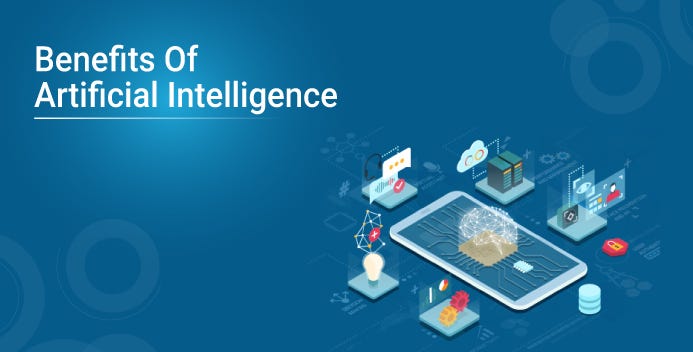10 Benefits of Artificial Intelligence
Artificial Intelligence (AI) has revolutionized various industries and continues to shape the way we live and work. In this article, we will explore the top 10 benefits of AI and how it impacts our daily lives.
Automation and Efficiency
One of the key advantages of AI is its ability to automate repetitive tasks, leading to increased efficiency and productivity. AI-powered systems can perform these tasks faster and more accurately than humans, freeing up valuable time for employees to focus on more complex and creative endeavors.
Enhanced Decision Making
AI technologies can analyze vast amounts of data in real time, providing valuable insights and aiding in decision-making processes. With AI algorithms, businesses can make data-driven decisions, identify patterns, and predict outcomes, leading to more informed and effective choices.
Improved Customer Experience
AI-powered chatbots and virtual assistants have transformed customer service by providing instant responses and personalized interactions. These virtual agents are available 24/7, ensuring prompt support and enhancing customer satisfaction.
Advanced Healthcare
AI has made significant advancements in healthcare, enabling early disease detection, accurate diagnosis, and personalized treatment plans. Machine learning algorithms can analyze medical data, identify patterns, and assist healthcare professionals in making more accurate and timely decisions.
Increased Safety
AI technologies contribute to improved safety in various domains. For instance, self-driving cars equipped with AI systems can detect and respond to potential hazards on the road, reducing the risk of accidents. AI-powered surveillance systems can also enhance security by detecting unusual activities and identifying potential threats.
Enhanced Education
AI has the potential to transform education by personalizing learning experiences and providing adaptive tutoring. Intelligent tutoring systems can analyze students’ performance data, identify areas of improvement, and tailor educational content accordingly, leading to more effective learning outcomes.
Streamlined Business Operations
AI technologies streamline business operations by automating workflows, optimizing supply chains, and improving inventory management. By leveraging AI, businesses can reduce costs, increase operational efficiency, and gain a competitive edge in the market.
Creative Assistance
AI can assist in creative endeavors such as content creation, design, and music composition. Natural Language Processing (NLP) algorithms can generate human-like text, while AI-powered design tools can automate repetitive design tasks and suggest innovative ideas, fostering creativity and productivity.
Efficient Data Analysis
AI algorithms can analyze vast amounts of data quickly and accurately, enabling businesses to gain valuable insights and make data-driven decisions. By automating data analysis, AI eliminates human errors and biases, leading to more reliable and efficient data processing.

AI has the potential to drive economic growth by creating new job opportunities and fostering innovation. As AI technologies continue to advance, new industries and markets emerge, leading to increased productivity and economic prosperity.
Frequently Asked Questions about the Benefits of Artificial Intelligence
1. What is artificial intelligence (AI)?
Artificial intelligence refers to the development of computer systems capable of performing tasks that typically require human intelligence, such as visual perception, speech recognition, decision-making, and problem-solving.
2. How does AI benefit businesses?
AI can benefit businesses in numerous ways, including automating repetitive tasks, improving efficiency, enhancing customer experiences, enabling data-driven decision-making, and enabling the development of innovative products and services.
3. Can AI improve healthcare?
Yes, AI has the potential to revolutionize healthcare by assisting in diagnostics, predicting disease outbreaks, personalizing treatment plans, and analyzing medical data to identify patterns and trends.
4. Does AI have any impact on transportation?
Absolutely. AI can improve transportation systems by optimizing traffic flows, enabling autonomous vehicles, enhancing logistics and supply chain management, and improving overall safety and efficiency.
5. How can AI enhance cybersecurity?
AI can enhance cybersecurity by detecting and preventing cyber threats, identifying patterns of malicious activities, and improving the overall resilience of computer systems against cyberattacks.
6. Can AI be used in the field of finance?
Yes, AI is widely used in the finance industry to automate financial processes, detect fraud, provide personalized investment recommendations, and analyze large volumes of financial data.
7. What role does AI play in agriculture?
AI can play a significant role in agriculture by optimizing crop yields, monitoring soil conditions, predicting weather patterns, and assisting in precision farming techniques.
8. Does AI have any impact on education?
Absolutely. AI can enhance education by providing personalized learning experiences, automating administrative tasks, facilitating adaptive learning platforms, and improving accessibility to education for all.
9. Can AI assist in environmental conservation?
Yes, AI can assist in environmental conservation efforts by analyzing large sets of environmental data, monitoring endangered species, predicting natural disasters, and optimizing energy consumption.
10. How does AI impact job roles and employment?
AI has the potential to automate certain job roles, but it also creates new job opportunities in the fields of AI development, data analysis, and machine learning. It is more likely to transform job roles rather than completely replace them.




